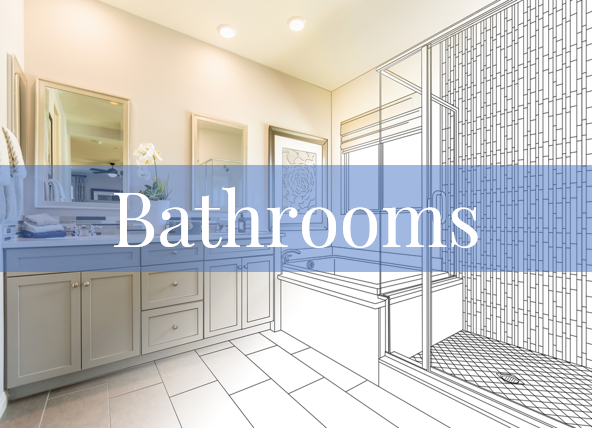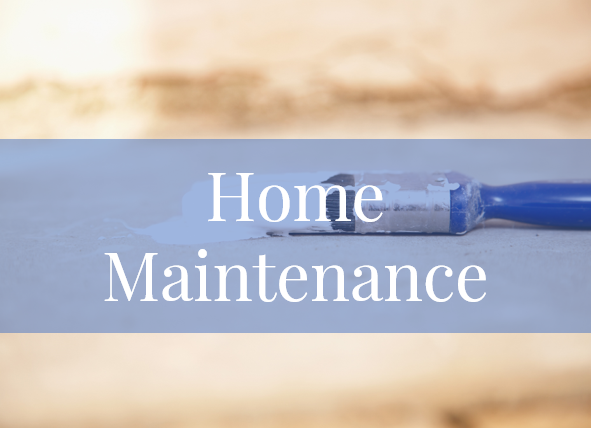10 Things You Need to Know Before You Start a Kitchen Renovation
/Homeowners spend a lot of money on renovations each year, and a lot of that money is spent on the heart of the home … the kitchen. If you're thinking a kitchen renovation is in your future, then there are some things you need to know before you get started.
There will likely be some unexpected things happening during the renovation, but the more you are prepared, the fewer surprises you'll encounter. We will share with you our top 10 tips for what we feel you need to know before you get started on your dream kitchen renovation.
Prefer to listen?
1. Expect to be without your kitchen for an extended period of time
Now, I'm not suggesting that you're going to be without your kitchen for months on end, but if you’re planning a complete kitchen renovation, you can expect to be without the full use of your kitchen for at least two to four weeks. Depending on how extensive your renovation is, it may be necessary to remove all of the cabinets right from the start of the project. Other times, some of your cabinets can remain in place so that you have a semi-functional kitchen while some of the work is getting completed.
For example, if you are having a load-bearing wall taken down, which means adding beams, additional supports, and maybe even footings in the basement, it will be beneficial for your contractor to remove all of the cabinets on the first day to ensure working around them doesn’t slow down work that needs inspections by city inspectors.
I always recommend that our clients empty everything out of their existing cabinets, box up what they don't need on an everyday basis, and relocate the rest to another area of the house where they can set up a temporary kitchen. This may be the dining room or even a space in the basement. Some of our clients have even used a guest bedroom and turned it into a temporary kitchen. One of our clients asked us to install a stove and fridge receptacle in her unfinished base and install a couple of her base cabinets in the basement on the first day of work. This enabled her to have a fully functional stove, 4’ of cabinets with a countertop, and a full fridge. Essentially, she had a decent kitchen to work in the whole time. It cost her a little extra for the work, but she saved tons of money on eating out! For more ideas, check out our blog post,
6 Ways to Prepare Meals During a Kitchen Renovation.
2. Have everything on site before the first hammer swings
I'm not suggesting that you need to have every single fixture or tile in your home before demolition starts, but at the very least, you should have every decision finalized and made before any construction begins.
Many of these decisions need to be made long before construction starts. For example, you should pick out your stove and fridge early in the process. The size of many of your cabinets may depend on this and it's important for your cabinet maker to know what those sizes are.
Many years ago, one of our clients sent us the specifications of the fridge that she was purchasing for her new kitchen. We built the kitchen to suit. Although her fridge was supposed to be delivered weeks before we needed to move it into place, it turned out the fridge she wanted was backordered and eventually discontinued. She went into the store, selected a different fridge, and didn't even realize it was a completely different size. All of the cabinets were in place, and we couldn't fit her fridge in. She either needed to select a different fridge or pay to have new cabinets built.
Making selections for the tile, paint colours, and flooring is something that needs to be done early in the process as well and should definitely be completed before the demolition starts. Sometimes other decisions end up being made as a result of your flooring choices or the colour of paint you're using on the cabinets. By starting this process early, you can avoid a lot of disappointment later on. During COVID, many of our clients had to narrow their selection of countertops down to about five choices and be happy with whatever was available. Many countertops were either backordered, discontinued, or stuck on a boat in Spain and wouldn't make it to the job site in a timely fashion.
3. The work probably won't be continuous
I'm not suggesting that your workers might show up for 2 or 3 days and disappear for a week. However, what is important to understand is that there might be times when it seems like nothing is happening on site.
For example, once your cabinets are in, your countertop needs to be templated. It will normally take 2 to 3 weeks from that point before the fabricated countertop can be installed. Your sink and faucet, dishwasher, and backsplash cannot be installed until the countertop goes in. It's very possible that all of the other work on site is done, and therefore the rest of the work is halted, waiting for the countertop to be installed.
4. Decide right at the outset how specific you want to be about the details
Everyone is different. Some people are very precise about how they want things done, while others just want everything to be done properly. Decide where you are on that scale. If you are very fussy about exactly how things should be completed, then you need to communicate that before any construction begins.
For example, one of our clients was usually home during all aspects of the construction. One day, she had to be away for most of the day for an appointment. Before she left, we asked her where she wanted the handles placed on the cabinets. She told us, and we even marked it with tape and got her to approve it. When she got home that evening, she wasn't happy with where the cabinet handles were located and wanted them all moved 2 mm to the right. That's pretty specific. We are happy to accommodate our clients, as we do recognize some people are very particular about how they want things done, but that needs to be communicated in just as particular a fashion.
On the same note, if you are wanting things done in an extremely particular way, you might want to ensure that you are home during each day of construction. If you are going to be away for a couple of days or even for a few hours of a work day, talk to your contractor in advance. It's possible other work could be done that doesn't require you to be there, or your contractor could be on a different job site entirely on the days that you cannot be home. There's nothing worse than thinking you understand what your client wants, only to find out you have to redo it because they wanted something different.
5. Speak up if something isn't right … and do it immediately!
I always tell clients that it's nice to get compliments, but it's even better when you let me know that we've done something wrong so that we can ensure we can correct it. The sooner you let your kitchen contractor know that there is an issue or problem, the easier it is for them to fix it.
I'm going to qualify that by recommending that you point out mistakes, not portions of the project that are incomplete. Nothing drives us crazier than a client who comes to us every day and says, "This hasn't been done yet; why isn't it done?" Unless your contractor has indicated that your project is complete, don't point out areas of the project that haven't been completed yet, as they are most likely still scheduled to be done. This is the time to point out a mistake, such as the wrong paint colour on the wall, the wrong hardware on the cabinets, or even a device box that has been put in the wrong location in the ceiling to hang your light fixture. It's not the time to present them with a list of unfinished project areas.
It's also important to speak up when something isn't being done right or the workmanship isn't what you expected. If you wait until the very end, it's much harder to fix, and in some instances, it can't even be done. We had a client who didn't like the way her backsplash tile was being installed. She had asked for a specific design, and both she and our tile setter had a good understanding of what she wanted. However, it turns out that what she really wanted was a herringbone design. (which is not what she originally communicated). She never said anything until weeks after the project was completed. She could have said something to our tile setter while he was installing the tile, or even the next day when he returned to finish the installation and do the grouting. Instead, she waited until the project was already completed. We still offered to tear down the tile and redo it, but she didn't want to take a chance on it damaging the new countertop or appliances. Instead of saying something as it was being done (she knew it wasn’t what she really wanted but didn’t want to say anything), she now lives with looking at an installation of tile that she's not happy with.
6. Expect change orders and add-ons
As much as we try to anticipate every aspect of every job we quote, it's impossible to know what's behind walls or what we might find during the process. For you as the homeowner, it's also impossible for you to anticipate every possible need or want for a project. Often, once things get started, you may decide that you want to add an extra receptacle or pot light. If you plan for some unexpected expenses, it won't be as much of a surprise or hurt the pocketbook. Budgets are nice to stick to but are often unrealistic during a renovation. The older your home, the more surprises you might expect as well. However, this isn't a rule of thumb because we have encountered many almost-new homes that have deficiencies right back to the builder. When it comes to renovations, expect the unexpected!
7. The mess is temporary
We've been told numerous times that one of the things we are well known for is how clean we keep the job sites. Our clients are always thrilled that we clean every day and leave the house in livable condition. However, renovations come with a mess. No matter how clean the team is, there will be dust and a mess, but know that this mess is temporary and things will get back to normal. Your house will feel disorganized and in a state of chaos, but this too will come to an end.
8. Be ready for the timeline to change
Although your contractor can usually give you a fairly good idea of how long everything should take, that can change on an almost daily basis. During COVID, we encountered this all the time, and it became a way of life on job sites. Even today, sometimes you just can't control what happens, which can affect a timeline. A worker on site can fall ill, a homeowner's loved one can pass away, and materials end up being backordered or are just out of stock when needed on site. Just about anything can happen that affects the timeline. Be prepared and be flexible.The need to change the timeline is usually no one's fault in particular, but rather a situation that results because of circumstances. The more patience and understanding you have, the less stress you will feel.
9. Don't be afraid to make changes
Try not to make sweeping changes like altering the size of cabinets, which will require them to be completely remade. The bigger the change, the more it will cost you. However, you also don't want to have any regrets after the fact.
Kitchen renovations are big projects and usually require a fairly large investment. If you cut corners or decide not to make changes that you really want to see happen, you will end up regretting it and will be looking at that regret every day for the next 10 to 15 years. If you think you want something changed, talk to your contractor and see how big of a deal it really is. Sometimes what you thought was a big problem might not be. Other times, it might require a lot of reworking. Find out what the cost will be and decide if it's worth it.
10. Don't be afraid to be creative
I'm the last one to suggest that people follow trends, and I'm certainly not suggesting that now. However, don't be afraid to be a little bit creative in your kitchen. Sometimes people get too caught up in having a white kitchen and keeping everything very neutral. This can leave your kitchen looking boring and lacking in appeal.
You can get creative and add some interest by painting your island a fun colour, adding a fun and creative backsplash tile, using some reclaimed wood to install open shelves instead of upper cabinets in some areas of your kitchen, or even selecting an interesting countertop material or colour.
BONUS TIP: Know what parts of the project to leave to the pros
Doing some of your kitchen renovation as a DIY project can be a great way to save money on the project and instill some pride of ownership as well. If you can do good edge lines, then why not consider painting the walls, ceiling, and trim in your kitchen? Have you tried your hand at tiling before? If so, then install the backsplash yourself. However, the main things you should definitely leave to the pros are the plumbing, electrical, and cabinet fabrication and installation.
In summary…
The more prepared you are for a kitchen renovation, the smoother things will go. Renovations can be stressful, but if you follow some of the tips we’ve outlined in this post, I guarantee you’ll reduce your stress load during the project itself.


















